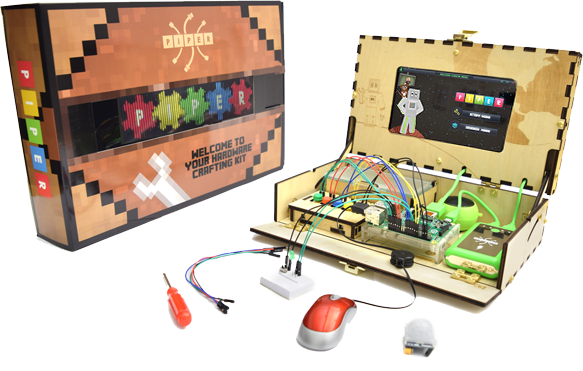Technology is changing fast, and the next generation of inventors and engineers will need to follow their curiosity to take on new challenges. One company has raised some cash to facilitate exactly that.
Piper is a startup that designs, builds, and sells computer kids aimed at children, and it has secured $2.1 million in a seed-funding round. Investors include Princeton University, Reach Capital, 500 Startups, FoundersXFund, Skype cofounder Jaan Tallinn, and Makey Makey founder Jay Silver. The company plans to use this cash to build out its PiperEDU initiative that will attempt to introduce its kits to educators who want to teach students about making, coding, and engineering in the classroom. It will use a new version of Piper’s $299 computer kit paired with Microsoft’s brick-building game Minecraft.
The PiperEDU product will run on the latest Raspberry Pi 3, which is a tiny computer built specifically to hit a low cost while remaining open for tinkering and expansion. Its Minecraft integration will have students assembling their computers and building gadgets to solve challenges inside of the game. This is separate from Microsoft and developer Mojang’s own MinecraftEDU efforts, which looks to do something similar but with a focus on software rather than a combination of coding and hardware.
GamesBeat asked Piper cofounder Mark Pavlyukovskyy about breaking into the education space. He explained that his team has already worked out distribution and how its business model will work with school districts.
“Assembled units are delivered to U.S.-based warehouses, where they get fulfilled to schools and districts,” Pavlyukovskyy said. “We are also implementing the early stages of our rental program, where schools and educators who want to try Piper can rent a set of kits for a period of time and return them in order to bring the Piper experience to their students at a lower price point.”
Getting a contract with various schools could mean big bucks for Piper since districts buy in bulk. Educators also have an interest in science, technology, engineering, and mathematics [STEM] fields, and they are looking for novel ways to introduce those subjects to students. Minecraft is a common trojan horse for STEM, and Piper is hoping that will hold true for its products.
“Our goal is to empower every single kid in the world to see technology as an empowering tool they can harness rather than complex and magical devices that can only be consumed,” Pavlyukovskyy said. “With this goal, we see classrooms as a perfect distribution vehicle for bringing the Piper experience to students who may not be able to afford the product.”
Of course, bringing the product to students is one thing. Helping teachers understand PiperEDU and how to use it could still prove a challenge. But Pavlyukovskyy has faith in educators.
“Piper is designed for a 7 year old to pick up and play with no intervention from adults,” he said. “The same applies to teachers, who can pick up the product and get familiar with it after building and playing with it within several hours. For some teachers who are not familiar with technology, but want to use Piper in the classroom, we are designing professional development tools including videos, FAQ, featured educators who answer questions on our forums and a annual gathering of Piper certified educators called PiperCon.”
VentureBeat's mission is to be a digital town square for technical decision-makers to gain knowledge about transformative enterprise technology and transact. Learn More

